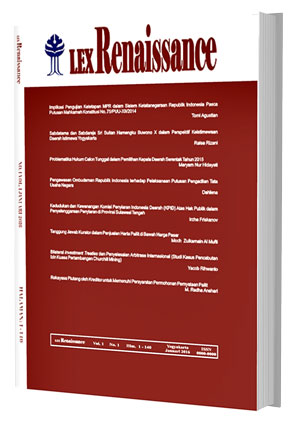Main Article Content
Abstract
Corruption is an endless problem in Indonesia. Judging from its practice, corruption is often identified with the abuse of authority or power for personal gain. The issues raised in this study are, first, how is the revocation of the rights to be elected in the perspective of laws and regulations? Second, how is the effectiveness of revocation of the rights to be elected in eradicating corruption? This study aims to analyze the effectiveness of the law of revocation of the rights to be elected against corruptors in eradicating corruption. The analysis is described through the statutory approach and conceptual approach. This study concludes, first, revocation of the rights to be elected against corruptors is one of criminal sanctions and an effective effort in eradicating corruption and does not constitute a violation of human rights. Criminal law, human rights law and the Corruption Act provide legitimacy to revoke the rights to be elected against corruptors. Second, the effectiveness of the law on revocation of such rights has a deterrent and prevention effects. Revocation of selected rights has become a necessity for judges to make revocation of chosen rights as a standard imposing sanctions for corruptors in the context of eradicating corruption.
Keywords
Article Details
Authors who publish with this journal agree to the following terms:
a. Authors retain copyright and grant the journal right of first publication with the work simultaneously licensed under a Creative Commons Attribution License that allows others to share the work with an acknowledgement of the work's authorship and initial publication in this journal.
b. Authors are able to enter into separate, additional contractual arrangements for the non-exclusive distribution of the journal's published version of the work (e.g., post it to an institutional repository or publish it in a book), with an acknowledgement of its initial publication in this journal.
c. Authors are permitted and encouraged to post their work online (e.g., in institutional repositories or on their website) prior to and during the submission process, as it can lead to productive exchanges, as well as earlier and greater citation of published work (See The Effect of Open Access).References
- Buku
- Chatrine, Darul Rosikah dan Dessy Marliani Listianingsih, Pendidikan Anti Korupsi: Kajian Antikorupsi Teori dan Praktik, Sinar Grafika, Jakarta, 2016.
- H.S., Salim dan Erlis Septiana Burbani, Penerapan Teori Hukum Pada Tesis dan Desertasi, Rajawali Pers, Jakarta, 2013.
- K.M., Smith dan Rhona, dkk., Hukum Hak Asasi Manusia, PUSHAM UII, Yogayakarta, 2008.
- Kasim, Azhar, Pengukuran Efektifitas Dalam Organisasi, Penerbit Fakultas Ekonomi Universitas Indonesia, Jakarta, 2000.
- Kelsen, Hans, Teori Hukum Murni: Dasar-Dasar Ilmu Hukum Normatif, Nusamedia & Nuansa, Bandung, 2007.
- Marzuki, Suparman, To Promote: Membaca Perkembangan Wacana Hak Asasi Manusia di Indonesia, PUSHAM UII, Yogyakarta, 2012.
- Nawawi, Arief Barda, Kapita Selekta Hukum Pidana, Citra Aditya, Bandung, 2013.
- O.S., Hiariej, dan Eddy, Prinsip-Prinsip Hukum Pidana, Cahaya Atma Pustaka, Yogyakarta, 2018.
- Praja, Juhaya S., Teori Hukum dan Aplikasinya, Pustaka Setia, Bandung, 2014.
- Sianturi, Asas-Asas Hukum Pidana Di Indonesia Dan Penerapannya, Alumni Ahaem-Petehaem, Jakarta, 1996.
- Syamsuddin, Aziz, Tindak Pidana Khusus, Sinar Grafika, Jakarta, 2016.
- Jurnal
- Muharosa, Haliva, “Tinjauan Yuridis Terhadap Pencabutan Hak Politik Bagi Terpidana Korupsi Di Indonesia”, Jurnal JOM Fakultas Hukum, Vol. 3 No. 1, 2016.
- Samekto, FX Adji, “Menggugat Relasi Filsafat Postivisme Dengan Ajaran Hukum Doktrinal” Jurnal Dinamika Hukum, Vol. 12 No. 1, 2012.
- Yanto Oksidelfa, “Efektifitas Putusan Pemidanaan Maksimal Bagi Pelaku Tindak Pidana Korupsi Dalam Rangka Pengentasan Kemiskinan”, Syaih Kuala Law Jurnal, Vol. 1 No. 2, 2017.
- Peraturan Perundang-Undangan
- Kitab Undang-Undang Hukum Pidana.
- Putusan Mahkamah Konstitusi Nomor 14-17/PUU-V/2007.
- Undang-Undang Nomor 20 Tahun 2001 tentang Perubahan atas Undang-Undang Nomor 31 Tahun 1999 tentang Pemberantasan Tindak Pidana Korupsi.
- Undang-Undang Nomor 39 Tahun 1999 tentang Hak Asasi Manusia.
- Internet
- “KPK: Hak Politik Dicabut 2013-2017”, https://nasional.kompas.com/read/ 2018/09/18/13252541/kpk-hak-politik-26-koruptor-dicabut-sepanjang-2013-2017, diakses tanggal 2 Februari 2018.
- “KPK Harap Hakim Pikirkan Pentingnya Pencabutan Hak Politik Koruptor”, https:nasional.kompas.com/read/2017/01/06/09374441/kpk.harap.hakim.pikirkan.pentingnya.pencabutan.hak.politik.koruptor, diakses tanggal 2 Februari 2019.
- “Tindak Pidana Korupsi Sebagai Extraordinary Crime”, https://www.researchgate.net/publication/322789917_TINDAK_PIDANA_KORUPSI_SEBAGAI_EXTRAORDINARY_CRIME, diakses tanggal 10 Februari 2019.
- “Terbukti Korupsi, Ini 8 Pejabat Yang dicabut Hak Politiknya”, https://news.okezone.com/read/2018/03/30/337/1879995/terbukti-korupsi-ini-8-pejabat-yang-dicabut-hak-politiknya, diakses tanggal 2 Februari 2019.
References
Buku
Chatrine, Darul Rosikah dan Dessy Marliani Listianingsih, Pendidikan Anti Korupsi: Kajian Antikorupsi Teori dan Praktik, Sinar Grafika, Jakarta, 2016.
H.S., Salim dan Erlis Septiana Burbani, Penerapan Teori Hukum Pada Tesis dan Desertasi, Rajawali Pers, Jakarta, 2013.
K.M., Smith dan Rhona, dkk., Hukum Hak Asasi Manusia, PUSHAM UII, Yogayakarta, 2008.
Kasim, Azhar, Pengukuran Efektifitas Dalam Organisasi, Penerbit Fakultas Ekonomi Universitas Indonesia, Jakarta, 2000.
Kelsen, Hans, Teori Hukum Murni: Dasar-Dasar Ilmu Hukum Normatif, Nusamedia & Nuansa, Bandung, 2007.
Marzuki, Suparman, To Promote: Membaca Perkembangan Wacana Hak Asasi Manusia di Indonesia, PUSHAM UII, Yogyakarta, 2012.
Nawawi, Arief Barda, Kapita Selekta Hukum Pidana, Citra Aditya, Bandung, 2013.
O.S., Hiariej, dan Eddy, Prinsip-Prinsip Hukum Pidana, Cahaya Atma Pustaka, Yogyakarta, 2018.
Praja, Juhaya S., Teori Hukum dan Aplikasinya, Pustaka Setia, Bandung, 2014.
Sianturi, Asas-Asas Hukum Pidana Di Indonesia Dan Penerapannya, Alumni Ahaem-Petehaem, Jakarta, 1996.
Syamsuddin, Aziz, Tindak Pidana Khusus, Sinar Grafika, Jakarta, 2016.
Jurnal
Muharosa, Haliva, “Tinjauan Yuridis Terhadap Pencabutan Hak Politik Bagi Terpidana Korupsi Di Indonesia”, Jurnal JOM Fakultas Hukum, Vol. 3 No. 1, 2016.
Samekto, FX Adji, “Menggugat Relasi Filsafat Postivisme Dengan Ajaran Hukum Doktrinal” Jurnal Dinamika Hukum, Vol. 12 No. 1, 2012.
Yanto Oksidelfa, “Efektifitas Putusan Pemidanaan Maksimal Bagi Pelaku Tindak Pidana Korupsi Dalam Rangka Pengentasan Kemiskinan”, Syaih Kuala Law Jurnal, Vol. 1 No. 2, 2017.
Peraturan Perundang-Undangan
Kitab Undang-Undang Hukum Pidana.
Putusan Mahkamah Konstitusi Nomor 14-17/PUU-V/2007.
Undang-Undang Nomor 20 Tahun 2001 tentang Perubahan atas Undang-Undang Nomor 31 Tahun 1999 tentang Pemberantasan Tindak Pidana Korupsi.
Undang-Undang Nomor 39 Tahun 1999 tentang Hak Asasi Manusia.
Internet
“KPK: Hak Politik Dicabut 2013-2017”, https://nasional.kompas.com/read/ 2018/09/18/13252541/kpk-hak-politik-26-koruptor-dicabut-sepanjang-2013-2017, diakses tanggal 2 Februari 2018.
“KPK Harap Hakim Pikirkan Pentingnya Pencabutan Hak Politik Koruptor”, https:nasional.kompas.com/read/2017/01/06/09374441/kpk.harap.hakim.pikirkan.pentingnya.pencabutan.hak.politik.koruptor, diakses tanggal 2 Februari 2019.
“Tindak Pidana Korupsi Sebagai Extraordinary Crime”, https://www.researchgate.net/publication/322789917_TINDAK_PIDANA_KORUPSI_SEBAGAI_EXTRAORDINARY_CRIME, diakses tanggal 10 Februari 2019.
“Terbukti Korupsi, Ini 8 Pejabat Yang dicabut Hak Politiknya”, https://news.okezone.com/read/2018/03/30/337/1879995/terbukti-korupsi-ini-8-pejabat-yang-dicabut-hak-politiknya, diakses tanggal 2 Februari 2019.




